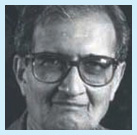 Amartya Sen
Amartya Sen
Amartya Sen is Lamont University Professor Emeritus, Harvard University and formerly Master of Trinity College, Cambridge. Professor Sen was born in 1933 in India and was educated at Presidency College, Calcutta and Trinity College, Cambridge. His research has included work on social choice theory and welfare economics (for which he was awarded the Nobel Prize in Economics in 1998), as well as development economics, causation of famines, theory of measurement, and moral and political philosophy. He is a Past President of the Econometric Society, the International Economic Association, the Indian Economic Association, and the American Economic Association. His publications include Choice, Welfare and Measurement; Resources, Values and Development; Inequality Reexamined; and Development as Freedom.
Prosser Gifford, Director
John W. Kluge Center
May 12, 2004
PROGRAM AGENDA
Wednesday, May 12, Morning session: (9 am - 12 pm)
The Changing Context of the Historical Narrative
Prosser Gifford (Kluge Center) Introduction: How do we identify the big historical themes?
Joke van der Leeuw-Roord (Euroclio) How do new historical ideas and concepts get included in textbooks especially relating to national history?
Jean Bethke Elshtain (University of Chicago) What are/have been/will be the changing contexts of historical narratives?
Patricia Albjerg Graham (Harvard University): What is the public purpose of history education? How has it changed and why?
Hugh Heclo (George Mason University) What role does religion play in the historical narrative? Introduction by Allen Thrasher (Asian Division).
Romila Thapar (Kluge Chair for Countries and Cultures of the South) Discussant.
Wednesday, May 12, Afternoon session (1:30 pm - 4:30 pm)
Interest Groups in Textbook Writing and Production
Arnita Jones (American Historical Association) Introduction: What are the concerns beyond professional history that determine inclusion and exclusion?
Wolfgang Hoepken (Georg Eckert Institut): How is the process of textbook production monitored and/or censored, and who does it?
Senator Lamar Alexander (Republican, Tennessee): What legislation is in process to bolster history and civics education?
Casper Grathwohl (Oxford University Press, Reference and Online Division): How do textbook publishers connect with various audiences both in structuring the text and selling the book?
Donald Ritchie (Office of the U.S. Senate) How do textbooks in American history get published and what are the challenges presented by "interested groups?"
Joseph Viteritti (Princeton University): Who is interested in history textbooks and how do they articulate their interests?
Richard Cronin (Congressional Research Service). Discussant.
Thursday, May 13, Morning session: (9 am - 12 pm)
History in the Classroom: An Interactive Discussion with Teachers and Students
Teachers and students will address the following questions: Why do we teach history? Is it important to learn history? How do you teach history? How do you learn history? How do you make history relevant for students? And, what makes history come alive for you?
Prosser Gifford (Kluge Center). Moderator.
Leslie Gray (Fairfax County Public School, Online Campus, Virginia) with her student, Kathleen Finegan.
Robert Hines (Richard Montgomery High School, Maryland) with his student, Saul Carlin.
Cathy Hix (Swanson Middle School, Virginia) with her student, Hannah Bauman.
Rawiya Nash (Stuart-Hobson Middle School, Washington, D.C) with her student, Kayla Jones.
Julianne Turner (University of Notre Dame). Discussant.
VIDEO CREDITS
We would like to thank the students and teachers of Fairfax County Public Schools who gave of their time and talent to develop and produce an introductory video![]() (Download a free version of RealPlayer (external link) software) for this panel. The students and teachers are:
(Download a free version of RealPlayer (external link) software) for this panel. The students and teachers are:
- James W. Robinson Secondary School
Teachers: Eileen Noonan, Markus Rodarmel, Shawn Spear, Tara McCord, and Jody McCabe - James Madison High School
Teachers: Suzanne Savage, Sia Knight, Susan Robeson, and Gordon Leib Students: Kelsey Teeters, Dani Weinberg, Matt Vossekuil, Will Eaton, and Jody McCabe's Theory of Knowledge class - With special thanks to Lis Edwards, Carl Plath, and Casey Clarke.
